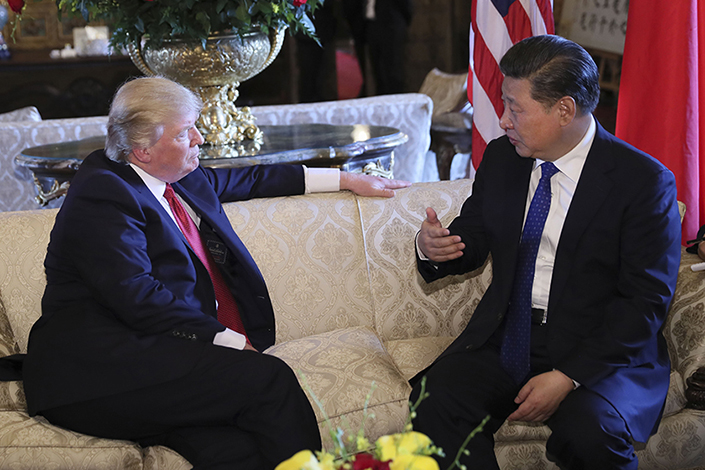China Affirms Currency Stance Following Trump’s U-Turn on Yuan

The Chinese government on Thursday reiterated that it will not attempt to boost exports through currency devaluation, after U.S. President Donald Trump said he had changed his mind and would not label China a currency manipulator.
“We have repeated that China has no intention to spur exports through competitive currency devaluation, and the renminbi has no base for continued devaluation,” Foreign Ministry spokesman Lu Kang said Thursday at a regular press conference in Beijing, commenting on Trump’s remark that contrasted with his repeated vows during his presidential campaign that he would brand China a currency manipulator on his first day in office.
“It’s an objective fact that China is not a currency manipulator,” Lu said.
Earlier on Thursday, a spokesman from China’s General Administration of Customs, affirmed that “important consensus” was reached at Chinese President Xi Jinping’s first meeting with Trump last week. Speaking at a press conference following the release of China’s March trade figures, Huang Songping said that greater communication and exchanges will promote the healthy development of bilateral trade and investment.
“We are willing to handle disputes and sensitive issues in a constructive way based on the principle of mutual respect and mutual benefit, to let people of both countries feel the gains from the development of Sino-U.S. relations,” Huang said.
As a presidential candidate, Trump frequently bashed China, the world’s second-largest economy following the U.S., blaming it for deliberately pulling down the value of the yuan to spur its exports, which he said hurts American jobs. But many economists, including in the U.S., disagreed, arguing that the Chinese government has been trying hard to stem the fall of the Chinese currency in recent years.
Trump repeated vows during the campaign that he would brand China a currency manipulator on his first day in office.
In an interview with The Wall Street Journal on Wednesday Washington time, however, Trump said he decided that China hasn’t been manipulating its currency for months, and he does not want to upset China because he is trying to seek its support in dealing with North Korea’s nuclear issue.
The U.S. Treasury Department is expected to release a report this week on China’s currency policies. The world has been closely watching whether Trump would fulfill his campaign vow, which could trigger U.S. retaliation in trade policies.
China’s imports from the U.S. reached 264.2 billion yuan ($38.4 billion) in the first quarter, up 33.1% from the same time last year. Exports to the U.S. grew 16.8% to 606.4 billion yuan, according to the customs department.
Trump apparently did not raise the currency issue with the Chinese president during his two-day visit to Trump’s private resort in Florida last week. During that meeting, Trump won Xi’s reaffirmation of China’s goal of a denuclearized Korean Peninsula.
This Wednesday, the two leaders spoke on the phone again about carrying out what the two sides have agreed on concerning trade and security talks. Xi emphasized China’s stance that it wants to seek a peaceful resolution to the North Korea nuclear crisis.
Contact reporter Wu Gang (gangwu@caixin.com)

- 1Cover Story: China Carves Out a Narrow Path for Offshore Asset Tokenization
- 2Drownings Shake Chinese Enthusiasm for Travel to Russia
- 3Over Half of China’s Provinces Cut Revenue Targets
- 4Li Ka-Shing’s Port Empire Hit by Forced Takeover Amid Panama Legal Dispute
- 5In Depth: China’s Mutual Fund Industry Faces Overhaul After a Banner 2025
- 1Power To The People: Pintec Serves A Booming Consumer Class
- 2Largest hotel group in Europe accepts UnionPay
- 3UnionPay mobile QuickPass debuts in Hong Kong
- 4UnionPay International launches premium catering privilege U Dining Collection
- 5UnionPay International’s U Plan has covered over 1600 stores overseas





